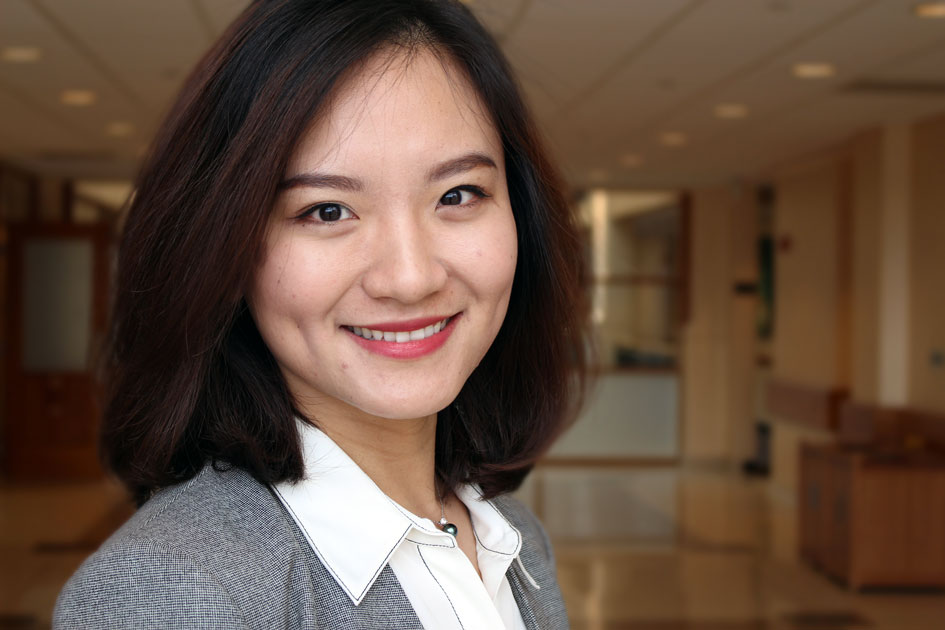
Demand for luxury goods exploded only recently in the 20th century, when consumers worldwide started paying for upscale items like Gucci flip-flops, Coach bags and Versace sunglasses.
Yajin Wang, a marketing professor at the University of Maryland’s Robert H. Smith School of Business, explores the expansion of exclusive brands in her research. But she takes a long view that stretches to ancient times.
“I think it’s a modern phenomenon,” she says. “But there’s actually a deep-rooted motivation, and it exists from an evolutionary perspective.”
Even animals like bowerbirds use colorful flowers to decorate their nests, similar to humans who gift jewels during courtship. “We’re not that different from the animal world,” Wang says. “The desire for luxury goods is in our blood.”
As a child growing up in Chongqing, one of China’s largest cities, Wang noticed the appetite for opulence and marveled at the prices people would pay for certain items.
While luxury brands hadn’t yet entered the Chinese market, she remembers her father complaining about her mother’s obsession with handbags. He saw no reason for 10 different purses.
“One of the first things you learn in economics class is that you pay for utility, right?” Wang says. “It’s fascinating to me that humans nowadays spend a lot of money on goods that, on the surface, don’t seem to serve a lot of functionality.”
Wang first explored this phenomenon as a mass communications graduate student at the University of Minnesota, after finishing at the top of her class at Peking University in Beijing.
Wang had never been to the United States before and didn’t realize how cold the Northern state would be. But she found herself absorbed in her studies.
During her research, she began brand consulting at Bain & Company in China, where she worked to understand consumer motivations. “I always wanted to go deeper into the ‘why’ on these research projects,” she says.
Curiosity led her to pursue a PhD in marketing at the University of Minnesota. One of her early papers, Conspicuous Consumption, Relationships, and Rivals: Women’s Luxury Products as Signals to Other Women, identifies the need for signaling within romantic relationships as one trigger for the purchase of luxury goods.
“People spend a lot of money to try to tell others who they are,” Wang says.
Her findings suggest gender differences. Men sometimes display pricey possessions to attract mates, while women use conspicuous luxury products as a signal to potential rivals that their romantic partner is especially devoted to them.
Wang explains the phenomenon with fingers clasped at her desk, flashing a diamond ring — an obvious example of a signal at play.
Her research not only shows why people purchase luxury goods, but how flaunting these items influences consumers’ thoughts.
Her 2018 study, The Devil Wears Prada? How Luxury Consumption Influences Prosocial Behavior, shows that just carrying an upscale bag can give consumers an inflated sense of status and decrease their prosocial behavior.
“If you think about how available these luxury goods are, it's no longer the case that only very few people have it,” Wang says. “You can rent them, people can borrow each other’s things, and it definitely has implications on consumers’ well being.”
She says the introduction of social media and globalization demystifies luxury goods for consumers, creating new trends that research hasn’t fully captured yet.
“Luxury used to be very European-market oriented, but the emerging market has become a bigger conversation of consumer segments,” Wang says. “There's a very interesting balance in terms of marketing. How can you position your brand as exclusive, while simultaneously growing sales globally?”
Wang sees major industry challenges, but also exciting opportunities, which she continues to explore through her research and consumer behavior classes at Maryland Smith.
She says she traded Minnesota for Maryland not only to be near Washington, D.C., but to work with her marketing idols — names she had read in research journals as a Phd student, like Rebecca Ratner, Rosellina Ferraro and Amna Kirmani — all Smith marketing professors.
“I was very, very honored that I could be colleagues with them,” Wang says.
Besides teaching her students, she encourages them to participate in research at Smith.
“I tell them, what you’ve contributed here, contributes to a top five world ranking in marketing,” Wang says. “Students should value and really appreciate this thought leadership — this excellence in terms of world-class research behind the content or teacher.”
— Kira Barrett, Communications Writer at the University of Maryland’s Robert H. Smith School of Business
Media Contact
Greg Muraski
Media Relations Manager
301-405-5283
301-892-0973 Mobile
gmuraski@umd.edu
About the University of Maryland's Robert H. Smith School of Business
The Robert H. Smith School of Business is an internationally recognized leader in management education and research. One of 12 colleges and schools at the University of Maryland, College Park, the Smith School offers undergraduate, full-time and flex MBA, executive MBA, online MBA, business master’s, PhD and executive education programs, as well as outreach services to the corporate community. The school offers its degree, custom and certification programs in learning locations in North America and Asia.